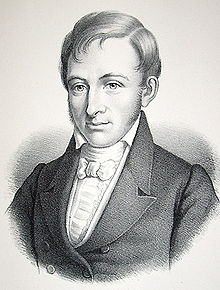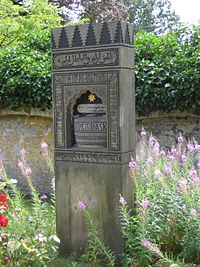- Rasmus Christian Rask
-
Rasmus (Christian) Rask (Danish pronunciation: [ˈʁɑsmus ˈʁɑsɡ]) (22 November 1787, Brændekilde on the Danish island of Funen - 14 November 1832, Copenhagen) was a Danish scholar and philologist.
Contents
Biography
Rask studied at the University of Copenhagen and at once showed remarkable talent for the acquisition of languages. In 1808 he was appointed assistant keeper of the university library and some years afterwards professor of literary history. In 1811 he published in Danish his Introduction to the Grammar of the Icelandic and other Ancient Northern Languages from printed and manuscript materials accumulated by his predecessors in the same field of research.
The reputation which Rask thus acquired recommended him to the Arnamagnæan Institution, by which he was employed as editor of the Icelandic Lexicon (1814) of Björn Halldórsson, which had long remained in manuscript. Rask visited Iceland, where he remained from 1813 to 1815, mastering the language and familiarizing himself with the literature, manners, and customs of Iceland. To the interest with which they inspired him may probably be attributed the establishment at Copenhagen, early in 1816, of the Icelandic Literary Society, of which he was the first president.
In October 1816, Rask left Denmark on a literary expedition financed by the king, to prosecute inquiries into the languages of the East, and collect manuscripts for the university library at Copenhagen. He proceeded first to Sweden, where he remained two years, in the course of which he made an excursion into Finland to study the language. Here he published, in Swedish, his Anglo-Saxon Grammar in 1817. In 1818, there appeared at Copenhagen, in Danish, an Essay on the Origin of the Ancient Scandinavian or Icelandic Tongue, in which he traced the affinity of that idiom to the other European languages, particularly Latin and Greek.
In the same year, he brought out the first complete editions of Snorri's Edda and Sæmundr's Edda (more commonly known as the Poetic or Elder Edda), in the original text, along with Swedish translations of both Eddas. From Stockholm, he went in 1819, to St Petersburg, where he wrote, in German, a paper on "The Languages and Literature of Norway, Iceland, Sweden and Finland," in the sixth number of the Vienna Jahrbücher. From Russia, he proceeded through Tartary into Persia, and resided for some time at Tabriz, Teheran, Persepolis, and Shiraz. In about six weeks, he made himself sufficiently master of Persian to be able to converse freely.
In 1820, he embarked at Bushire for Bombay; and during his residence there he wrote, in English, "A Dissertation on the Authenticity of the Zend Language" (Trans. Lit. Soc. of Bombay, vol. iii., reprinted with corrections and additions in Trans. R. As. Soc.). From Bombay he proceeded through India to Ceylon, where he arrived in 1822, and soon afterwards wrote, in English, "A Dissertation respecting the best Method of expressing the Sounds of the Indian Languages in European Characters," in the Transactions of the Literary and Agricultural Society of Colombo. Rask returned to Copenhagen in May 1823, bringing a considerable number of Oriental manuscripts, Persian, Zand, Pali, Sinhalese, and others, with which he enriched the collections of the Danish capital. He died in Copenhagen on the 14th of November 1832, at Badstuestraede 17, where a plaque commemorating him is found.
During the period between his return from the East and his death, Rask published in his native language a Spanish Grammar (1824), a Frisian Grammar (1825), an Essay on Danish Orthography (1826), a Treatise respecting the Ancient Egyptian Chronology and an Italian Grammar (1827), and the Ancient Jewish Chronology previous to Moses (1828). He also edited an edition of Schneider's Danish Grammar for the use of Englishmen (1830), and superintended the English translation of his Anglo-Saxon Grammar by Thorpe (1830).
He was the first to point out the connection between the ancient Northern and Western/Eastern Germanic languages on the one hand, and the Lithuanian, Slavonic, Greek, and Latin languages on the other; and he also deserves credit for having had the original idea of what is now called "Grimm's Law" for the transmutation of consonants in the transition from the old Indo-European languages to Teutonic, although he only compared Teutonic and Greek, Sanskrit being at the time unknown to him.
In 1822, he was master of no fewer than twenty-five languages and dialects, and he is stated to have studied twice as many. His numerous philological manuscripts were transferred to the Royal Library at Copenhagen. Rask's Anglo-Saxon, Danish and Icelandic Grammars were brought out in English editions by Thorpe, Repp, and Dasent, respectively. Karl Verner was one of the later philologists inspired by Rask's work.[1]
Bibliography
- Undersøgelse om det gamle Nordiske eller Islandske Sprogs Oprindelse (Essay on the Origin of the Ancient Norse or Icelandic Tongue), 1818
- Anvisning till Isländskan eller Nordiska Fornspråket, 1818
- Spansk Sproglære (Spanish Grammar), 1824
- Frisisk Sproglære (Frisian Grammar), 1825
- Dansk Retskrivingslære (Essay on Danish Orthography), 1826
- Italiænsk Formlære (Italian Grammar), 1827
- Den gamle Ægyptiske Tidsregning (Ancient Egyptian Chronology), 1827
- Vejledning til Akra-Sproget på Kysten Ginea (Introduction to the Accra language on the Guinea Coast), 1828
- Den ældste hebraiske Tidsregning indtil Moses efter Kilderne på ny bearbejdet og forsynet med et Kart over Paradis (Ancient Jewish Chronology previous to Moses according to the Sources newly reworked and accompanied by a Map of Paradise), 1828
- A Grammar of the Danish language for the use of Englishmen, 1830
- Ræsonneret lappisk Sproglære (Sami grammar), 1832
- Engelsk formlære (English grammar), 1832
- Über das Alter und die Echtheit der Zendsprache und des Zend-Avesta, und Herstellung des Zend-alphabets (Avestan language, "The age and the authenticity of the Zend language and Zend-Avesta, and manufacture of the Zend alphabet: in addition to an overview of the whole linguistic family").
References
- ^ Dodge, D. K. (1897). "Verner Dahlerup: Nekrolog över Karl Verner". The American Journal of Philology 18 (1): 91–93. JSTOR 287936.
 This article incorporates text from a publication now in the public domain: Chisholm, Hugh, ed (1911). "Rask, Rasmus Christian". Encyclopædia Britannica (11th ed.). Cambridge University Press.
This article incorporates text from a publication now in the public domain: Chisholm, Hugh, ed (1911). "Rask, Rasmus Christian". Encyclopædia Britannica (11th ed.). Cambridge University Press.
External links
- Rask's Singalesisk Skriftlære online
- Google book link to Anvisning till Isländskan eller Nordiska Fornspråket
- Rasmus Christian Rask at Find a Grave
 James Wood (1907). "Rask, Rasmus Christian". The Nuttall Encyclopædia.
James Wood (1907). "Rask, Rasmus Christian". The Nuttall Encyclopædia.
Categories:- 1787 births
- 1832 deaths
- Scholars of Old Norse and Scandinavian studies
- Danish linguists
- Danish philologists
- Icelandic language
- Indo-Europeanists
- Grammarians of English
- Translators from Old Norse
Wikimedia Foundation. 2010.


